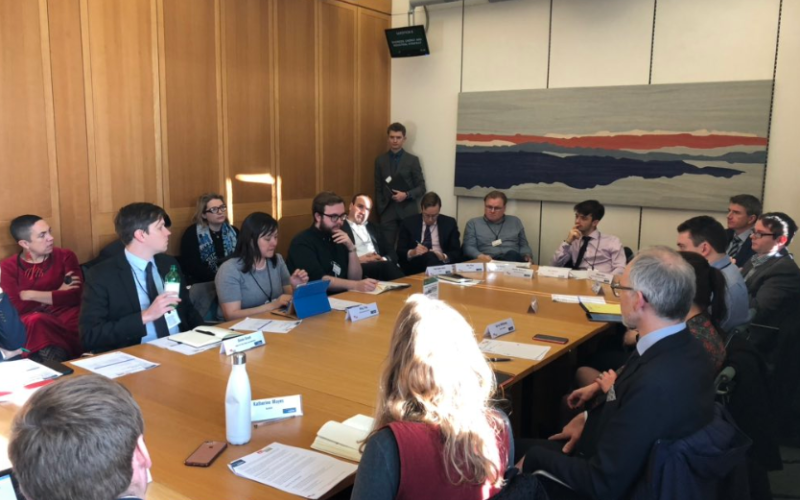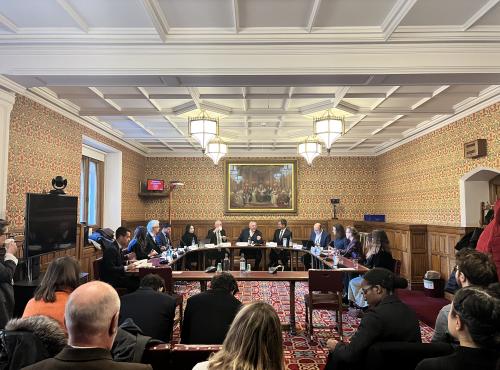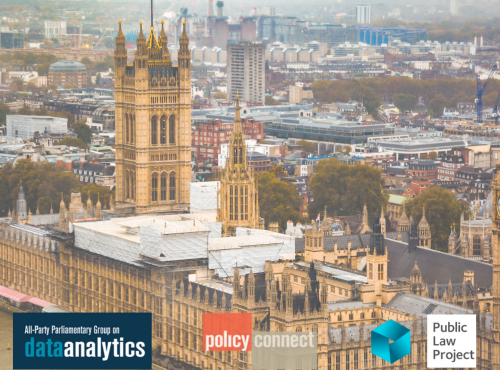Data and Technology Ethics Inquiry Health roundtable
Last week we held our third Data and Technology Ethics Inquiry roundtable on health, chaired by Darren Jones MP and Lee Rowley MP.
This discussion was very well attended with representatives of privacy organisations, NHS England, medical products manufacturers, clinical professionals, technology industry representatives and academics alongside our steering group.
The roundtable began with opening remarks outlining the purpose of the Inquiry from co-chairs Darren Jones and Lee Rowley. These remarks highlighted the key challenge of maintaining public trust in increasingly data driven areas of everyday life. Participants then introduced themselves and their interest in data ethics in health.
Andrew Davies of the Association of British Health Tech Industries introduced the work of the association and outlined the safeguards which currently exist. Andrew said that trusts are improving in the way they handle data but that there was variation in processes and progress. A standardised framework would help build confidence and enable different parts of the service to interact and share data in the interests of patients’ health.
Andrew also highlighted data trusts as a possible solution to the challenges around public trust in data use and security and the difficulty in cooperation between different parts of the health service. He stated a commitment to developing this concept and other participants also spoke positively of data trusts and their potential as a useful model of gathering data with oversight and cooperation.
Other participants highlighted the benefits of data sets which cover large groups and the way in which these can be used by the health service and other relevant organisations to plan for provision, and develop new and improved ways of preventing and treating ill-health. It was agreed that the public generally had confidence in sharing data with NHS bodies and understood that this was intended to be used to benefit society. However a distinction was made between the trust in public health bodies and concerns around the access to NHS patient data that private companies might seek to use and profit from. The lack of oversight in this area was flagged as of particular concern.
Alongside this, one participant made the point that transparency and consent in the NHS, as in many areas, had not been discussed with the public. This, alongside instances of data breaches and the lack of public awareness around the sharing of data with private companies, had caused unease. However, given that support for the NHS is among the highest for national institutions and signs that the public recognise the benefits of data use by the health service when engaged with it, is important to maintain and build on this trust through discussion with the public about why the NHS uses data and how this can be used to best used to support the health and wellbeing of patients.
This led to consideration of how principles of consent should be applied to data shared with health care bodies was discussed. Several participants discussed models of consent and the potential for transparency and trust to support updating the process of consent to match the current landscape of data driven services. It was stated that the nature of data use in health services often means data provided for one purpose can go on to inform other work the health service is doing to address the needs of the patient who shared the data.
A requirement for consent at every stage and for every purpose could become taxing on individuals and a suggestion which came up whereby patients could manage and approve the data accessible to the NHS was considered by many participants to be overly complex and requiring a level of participation by individuals that would be off-putting.
Some participants highlighted the possibility of implied consent underpinned by accessible and transparent processes enabling clear public understanding of data use by the NHS. However, the group recognised that in order to genuinely address concerns around data ethics in healthcare and maintain trust in the use of data there must be extensive engagement with the public.
The co-chairs ended the discussion by thanking the participants for attending and sharing their views and expertise on data ethics in health, and invited them to submit written evidence to the Inquiry. The steering group then reviewed the discussion and commented on the key themes drawn out by participants. There was consensus that there were important areas including public engagement, transparency and consideration of existing methods of data collection and processing and that many of these issues of data ethics in health are likely to be relevant to other industries.






